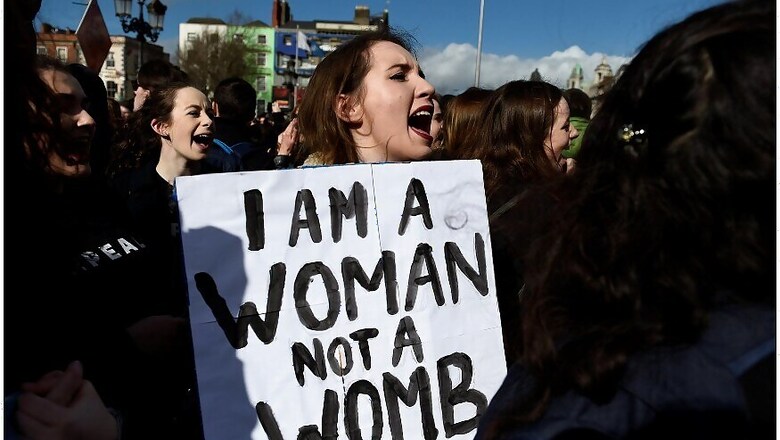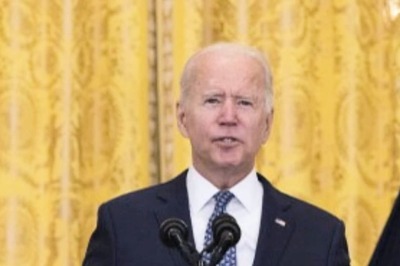
views
The U.S. Supreme Court defended abortion rights in a major ruling on Monday by striking down a Louisiana law placing restrictions on doctors who perform the procedure, dealing a blow to anti-abortion advocates.
The 5-4 ruling, with conservative Chief Justice John Roberts joining the four liberals justices in the majority, represented a victory for Shreveport-based abortion provider Hope Medical Group for Women in its challenge to the 2014 law. The measure had required doctors who perform abortions to have a sometimes difficult-to-obtain formal affiliation called "admitting privileges" at a hospital within 30 miles (48 km) of the clinic.
President Donald Trump's administration supported Louisiana in the case.
Anti-abortion advocates had hoped that the Supreme Court, with its 5-4 conservative majority, would be willing to permit abortion restrictions like those being pursued by Louisiana and other conservative states.
"Today's ruling is a bitter disappointment," said Marjorie Dannenfelser, president of anti-abortion group Susan B. Anthony List.
The decision, authored by liberal Justice Stephen Breyer, marked the second time in four years that the court ruled against an "admitting privileges" requirement
In 2016, the court struck down a Republican-backed Texas law that mandated admitting privileges and required clinics to have costly hospital-grade facilities, finding that the restrictions represented an impermissible "undue burden" on a woman's ability to obtain an abortion. Breyer wrote that the two laws are "almost word-for word identical" and that therefore the court had to reach the same result.
There is sufficient evidence to find that the Louisiana measure "would place substantial obstacles in the path of women seeking an abortion in Louisiana," Breyer added.
Roberts dissented in the 2016 case, which was called Whole Woman's Health v. Hellerstedt, but voted with the liberals in the Louisiana case based on the court's tradition of adhering to its precedents, he said.
"I joined the dissent in Whole Woman's Health and continue to believe that the case was wrongly decided. The question today however is not whether Whole Woman's Health was right or wrong, but whether to adhere to it in deciding the present case," Roberts wrote in a separate opinion.
At the same time, Roberts did question some of the court's analysis in the earlier ruling, suggesting he may side with his conservative colleagues in future challenges to abortion restrictions.
'Relieved'
As a result, the positive reaction to the ruling from abortion rights group was muted.
"We're relieved that the Louisiana law has been blocked today but we're concerned about tomorrow," said Nancy Northup, president of the Center for Reproductive Rights, which represented the Louisiana clinic.
Two of Louisiana's three clinics that perform abortions would have been forced to close if the law went into effect, according to lawyers for Hope Medical Group.
In a dissenting opinion, conservative Justice Samuel Alito wrote that Louisiana and Texas rulings are similar only because "the abortion right recognized in this court's decisions is used like a bulldozer to flatten legal rules that stand in the way."
Roberts also sided with the liberal justices in two other important rulings this month. One found that gay and transgender people are protected from workplace discrimination under federal civil rights law. The other blocked Trump's bid to end a program that protects from deportation hundreds of thousands of immigrants - often called "Dreamers" - who entered the United States illegally as children.
Several other cases involving legal challenges to abortion restrictions in other states are heading toward the justices that could provide other avenues for its conservative majority to roll back access to the procedure.
Trump, seeking re-election on Nov. 3, promised during the 2016 presidential race to appoint justices who would overturn the landmark 1973 Roe v. Wade ruling that legalized abortion nationwide. The Louisiana case marked the first major abortion dispute heard by the court since Trump appointed Brett Kavanaugh in 2018 and Neil Gorsuch in 2017 as justices. Both ruled in favor of the Louisiana abortion restrictions.
Abortion remains a divisive issue in the United States as it is in many countries. Christian conservatives - an important political constituency for Trump - are among those most opposed to it. The Republican president, who years earlier had supported abortion rights, attended an anti-abortion march in January and declared, "Unborn children have never had a stronger defender in the White House."
Abortion rights advocates have argued that restrictions such as admitting privileges are meant to limit access to abortion not protect women's health as proponents say. When the Supreme Court in 1992 reaffirmed the Roe v. Wade ruling, it prohibited laws that placed an "undue burden" on a woman's ability to obtain an abortion.
Baton Rouge-based U.S. District Judge John deGravelles cited the undue burden precedent when he struck down Louisiana's law in 2016. After Louisiana appealed, the New Orleans-based 5th U.S. Circuit Court of Appeals upheld the law.



















Comments
0 comment